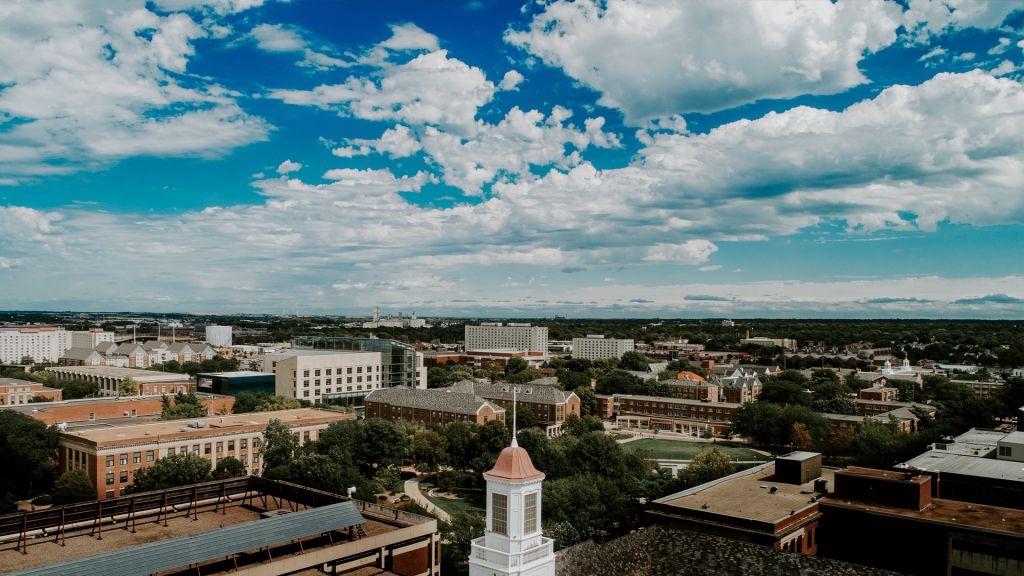University of Nebraska-Lincoln faculty, staff and students will collaborate this summer in a process to identify the university’s grand challenges – major societal issues that can be solved only through interdisciplinary collaboration. Chancellor Ronnie Green named this process as a goal of UNL’s N|2025 strategic plan in order to identify large problems facing our community, nation and world. Participants in these discussions are encouraged to offer perspectives that will help shape Nebraska’s trajectory for the next five years and beyond.
Background
Identifying a suite of grand challenges is one aim of the N|2025 strategic plan that was outlined in Chancellor Ronnie Green’s 2020 State of Our University address. The full suite of grand challenges will include up to three themes identified during this summer’s workshops and those outlined in the State of Our University address: early childhood education and development, sustainable water and food security, and resiliency in our changing climate.
Process
The virtual, multi-stage process will be facilitated by the UNL Office of Research and Innovation on behalf of the Office of the Chancellor. It will comprise seven stages, starting June 5 and concluding mid-July, after which the selected grand challenges will be announced with the start of the 2020-21 academic year. The identified grand challenges themes will help guide activities and talent and be used to guide institutional investment and resource allocation. For questions about the process, contact Nathan Meier, assistant vice chancellor for research.
FAQ
Answers to questions related to the grand challenges process are provided here. Additional questions may be submitted to Nathan Meier, assistant vice chancellor for research.
At Nebraska, every person and every interaction matters. The grand challenges we pursue must reflect the breadth of research, scholarly and creative activity happening across campus. By recognizing how our combined strengths and expertise can be leveraged to solve our greatest problems, UNL can have major impact on our community, country and world.
Chancellor Ronnie Green
Stage 1: Introducing the process
Format: WebinarnParticipants: Faculty, staff and studentsnnUNL leadership will inform participants about the goals for this initiative, identify opportunities and discuss planning and goal setting. u003ca href=u0022https://www3.research.ucla.edu/reo/staff/michelle-popowitzu0022u003eMichelle Popowitzu003c/au003e, University of California, Los Angeles, assistant vice chancellor for research and co-founder of UCLA Grand Challenges, will share her insights on how grand challenges can help an institution focus on a set of common goals to fulfill its mission. nnu003ca class=u0022dcf-btn dcf-btn-primaryu0022 href=u0022https://research.unl.edu/blog/grand-challenges-stage-1-resources/u0022 target=u0022_blanku0022u003eStage 1 Video u0026 Resourcesu003c/au003e
Stage 2: Understanding the Nebraska context
Format: Live forum, virtual Qu0026AnParticipants: Faculty, staff and studentsnnThis online forum will enable participants to discuss opportunities and challenges presented in the resources provided June 5 or introduce new topics and resources. A virtual Qu0026amp;A will allow for clarification and additional information sharing. Resources will be provided for review from organizations including the u003ca href=u0022https://blueprint-nebraska.org/u0022u003eBlueprint Nebraskau003c/au003e; u003ca href=u0022http://www.nasonline.org/u0022u003eNational Academy of Sciencesu003c/au003e; u003ca href=u0022https://www.nsf.gov/news/special_reports/big_ideas/u0022u003eNational Science Foundation’s 10 Big Ideasu003c/au003e; u003ca href=u0022https://bosr.unl.edu/nasisu0022u003eNebraska Annual Social Indicators Surveyu003c/au003e; u003ca href=u0022https://ruralpoll.unl.edu/u0022u003eNebraska Rural Pollu003c/au003e; u003ca href=u0022https://business.unl.edu/outreach/bureau-of-business-research/bureau-reports/u0022u003eBureau of Business Researchu003c/au003e; UNL Extension; and UNL’s Office of Research and Innovation.nnu003ca class=u0022dcf-btn dcf-btn-primaryu0022 href=u0022https://research.unl.edu/blog/grand-challenges-stage-2-resources/u0022 target=u0022_blanku0022u003eStage 2 Video u0026 Resourcesu003c/au003en
Stage 3: Determining selection criteria
Format: Online surveynParticipants: Participants from Stages 1 and 2 and deans, associate deans and department executive officers nnThis UNL-led activity will establish the criteria to evaluate the final set of proposed grand challenge themes based on a survey of participants. Survey results will be reviewed by a steering committee that will recommend three to five evaluation criteria to the executive leadership team.
Stage 4: Collecting ideas
Format: Facilitators from u003ca href=u0022https://knowinnovation.com/u0022 target=u0022_blanku0022u003eKnowinnovationu003c/au003e, the consultant that supported UNL’s NU FEWS 2016 scoping workshop, will conduct an intensive microlab focused on generating ideas for UNL’s Grand Challenge themes. nParticipants: Faculty, staff and students.nnFacilitators from Knowinnovation will conduct an intensive microlab focused on generating ideas for UNL’s Grand Challenge themes. Virtual breakout rooms will convene to capture participants’ suggestions. The latter half of the lab will be spent grouping themes, which may be further refined by the steering committee prior to the next stage.n
Stage 5: Exploring potential themes
Format: Live virtual discussion nParticipants: Faculty, staff and studentsnnKnowinnovation will lead discussion evaluating identified themes for final selection, using criteria established during Stage 3. The number of potential themes will be significantly narrowed.
Stage 6: Selecting the most promising themes
Format: Email reviews (convening via Zoom, as needed)nParticipants: External experts, steering committee, Executive Leadership TeamnnThe steering committee will identify and recruit a panel of external experts to review the Stage 5 work products based on the evaluation criteria established during Stage 3. Reviewers’ feedback will be summarized and recommendations for two or three new grand challenge themes will be made to the executive leadership team.
Stage 7: Drafting the final portfolio
Format: Virtual writing workshopnParticipants: Faculty, administrators and staffnnParticipants will outline, draft and review descriptions of each of the remaining potential Grand Challenges to include a vision, context and rationale for its selection; provide an inventory of UNL’s strengths and assets and those that are needed to tackle the challenge; and offer a list of the types of related steps the campus should consider pursuing in the next five years and beyond.nnThe final grand challenges themes were identified:n•tAnti-racism and racial equityn•tClimate resiliencen•tCommunity and economic vitalityn•tEarly childhood education and developmentn•tHealth equityn•tQuantum science and engineeringn•tScience, engineering, and technology for societyn•tSustainable food and water security
Final phase: Describing themes
Format: ZoomnParticipants: Faculty and staffnnThe Office of Research and Innovation will host three online sessions organized to guide writers through a process for preparing grand challenge theme descriptions:nn•tNov. 19, 10-11 a.m.: Theme description writing kickoff meetingn•tDec. 1, 10-11:30 a.m.: Theme writing check-in meetingn•tDec. 8, 10-11 a.m.: Theme description handoff meetingnnu003ca href=u0022https://docs.google.com/forms/d/e/1FAIpQLSd-1Ndy7mdtsTP2D0oUU9HN5pMEWjTf5cxKtKy1uPU8andWAg/viewformu0022 target=u0022_blanku0022u003eRegistration required.u003c/au003ennu003ca class=u0022dcf-btn dcf-btn-primaryu0022 href=u0022https://research.unl.edu/blog/final-stage-video-resources/u0022 target=u0022_blanku0022u003eFinal Stage Video u0026 Resourcesu003c/au003en






